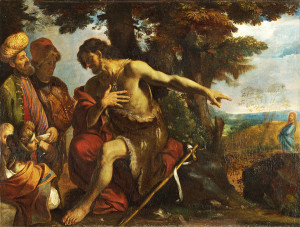Thoughts on Today’s Lessons for Dec. 6, 2015

Saint John The Baptist Preaching In The Wilderness
As we move into Advent, today’s readings tell of a Messenger who makes the way ready for the Messiah’s coming. Malachi, whose name in Hebrew actually means “my messenger,” warns that God’s Messenger will cleanse the rebuilt Temple with fire. The people must be made pure and pleasing to God. If you love Handel’s “Messiah,” you may feel like singing along with Malachi: “Who can endure the day of his coming?” he asks. “He is like a refiner’s fire!”
In place of a Psalm today we sing a Canticle taken from Luke’s Gospel. These verses tell the story of John the Baptist’s father, Zechariah, a priest of the Temple. When Zechariah had refused to believe that his elderly wife, Elizabeth, had really become pregnant after an angelic visitation, God struck him mute. But his voice returned when he held the infant and named him John. This child, Zechariah declares, is to be a prophet like Abraham, the Messenger who will “go before the Lord to prepare his way.”
Second Reading: Philippians 1:3-11
Paul begins his letter to the people of Philippi in Greece in formal “epistolary” fashion, offering greetings, love and thanks for their friendship and prayers for their well-being. Paul remembers with gladness how eagerly they had accepted and shared the message of the Gospel, the Good News of Jesus. He prays for this little congregation’s continued spiritual growth and insight, which he hopes will yield them a harvest of righteousness in God’s love through Christ.
Gospel: Luke 3:1-6
A bit later in Luke’s Gospel, John is grown up now, beginning his public life as a prophet “crying out in the wilderness.” Notice how much detail Luke gives to naming the Roman and Jewish leaders of the time, including Zechariah, John’s father. Perhaps this is Luke’s way of emphasizing that John was a real person, a real prophet who existed at a specific time. Then the narrative shifts as John utters the words of Isaiah, naming himself as the Messenger who will “Prepare the way of the Lord … make his paths straight.”
